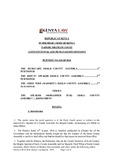L2012-06 Judicial Radical Surgery in Kenya: Beyond Independence and Accountability
Abstract
A 1989 World Bank Development Report recognized anticorruption and good
governance as prerequisites for Sub-Saharan economic development. Kenya’s
democratic transition entailed inter alia economic liberalization and the rule of law.
However, retention of the welfare-reducing Constitution perpetuated social
injustice. In 2003, constrained by an absent “rule of law culture” and negative
economic growth, the new Kenyan government chose incremental judicial reforms
over comprehensive constitutional reforms. It assumed that retaining the “second
best” Westminster Constitution while prioritizing construction of infrastructure,
would necessarily result in “second best” overall social welfare. It was wrong.
Nevertheless, the new Chief Justice implemented unprecedented “radical judicial
surgery” recommending that half the purportedly-corrupt judiciary should be
removed by Presidential tribunals of inquiry. Furthermore, newly-appointed High
Court judges endorsed the “radical surgery.” However, declining public confidence
in the judicial reform process culminated in refusal by the opposition party to
petition the hotly-disputed 2007 presidential election results, alleging biased
courts. Widespread post-election violence further decreased overall social welfare,
as indicated by the country’s subsequent promulgation of a new Constitution.
Ultimately, the High Court declared the “radical surgery” illegal. Given
inconsistent and novel approaches to vetting of judicial professionalism, it is useful
to learn lessons from previous and from comparative experiences in transitional
contexts to critically determine the extent to which various scrutinizing procedures
are predicated on political expediency, human rights principles or a combination of
both. By applying “the general theorem of second best,” this paper shall attempt to
measure the impact of Kenya’s radical judicial reform strategy on the
independence and accountability of judicial officials, and on overall social welfare
Collections
- Publications 2019 [91]

